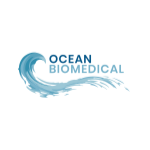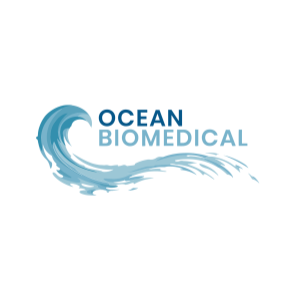Welcome to our dedicated page for Ocean Biomedical news (Ticker: OCEA), a resource for investors and traders seeking the latest updates and insights on Ocean Biomedical stock.
Ocean Biomedical Inc. (OCEA) is a biopharmaceutical innovator developing targeted therapies for oncology, fibrosis, and infectious diseases. This page provides investors and researchers with essential updates on clinical advancements, strategic partnerships, and regulatory milestones.
Access the latest press releases detailing OCEA's progress in immune checkpoint modulation and small molecule therapeutics. Stay informed about developments in bispecific antibody candidates targeting PD-1/CTLA-4 pathways and Chit1-focused fibrosis treatments.
Key updates include clinical trial progress, research collaborations, and scientific publications. Bookmark this page for real-time insights into OCEA's work addressing unmet medical needs through antibody engineering and molecular discovery.
Ocean Biomedical (NASDAQ: OCEA) announced new findings by its Scientific Co-founder, Jack A. Elias, MD, published in Cancer Research, regarding the role of Chi3L1 in glioblastoma. The study, led by Nikos Tapinos, MD, PhD, demonstrated that Ocean's anti-Chi3L1 antibody resulted in over a 60% reduction in glioblastoma tumor growth in human-implanted mouse models, signaling significant potential for treatment. The research highlights Chi3L1's role in glioma stem cell differentiation and suggests a novel therapeutic approach by inhibiting Chi3L1, which may block aggressive tumor evolution. The company aims to file an Investigational New Drug (IND) application for glioblastoma treatment. Ocean Biomedical is focused on developing innovative solutions for various cancers and related diseases.
Ocean Biomedical announced a presentation by its Scientific Co-founder, Dr. Jonathan Kurtis, at PATH Malaria’s annual retreat in Washington, DC, discussing a novel malaria vaccine and treatment. The vaccine targets three blood stage events in the malaria lifecycle, aiming to enhance efficacy. Ocean Biomedical is also working on the PfGARP component as a therapeutic target for new anti-malarial drugs. Dr. Kurtis emphasized that malaria is the leading killer of children worldwide, with rising deaths and drug resistance requiring urgent new solutions. Current vaccines have low efficacy, and without new approaches, progress against malaria may be lost. The company aims to develop highly effective vaccines and drugs, addressing a significant global health crisis.
Ocean Biomedical, Inc. (NASDAQ: OCEA) announced that Dr. Jack A. Elias received a Notice of Allowance from the USPTO for a patent covering a therapeutic molecule for pulmonary fibrosis. This molecule aims to inhibit Chitinase 1 and has shown up to 90% reduction in collagen accumulation in animal models. The approach targets multiple conditions, including Idiopathic Pulmonary Fibrosis (IPF) and genetic pulmonary fibrosis. Currently, there are no disease-modifying agents for pulmonary fibrosis, which affects around 100,000 people annually in the U.S., with limited treatment options available. Ocean Biomedical is moving towards IND-enabling studies, with potential applications extending to other fibrotic diseases.
Ocean Biomedical has announced significant financing to support its innovative biopharmaceutical initiatives. The company has secured a $59 million commitment from Vellar Opportunity Fund and a $75 million Common Stock Purchase Agreement with White Lion Capital, totaling $134 million in investments. Additionally, Ocean reports $123.9 million in grants to advance its pipeline in oncology, fibrosis, and infectious disease. Key milestones include discoveries in cancer treatment targeting CTLA-4, a novel treatment for pulmonary fibrosis, and advancements in malaria therapeutics. With a strong capital position, Ocean aims to expedite its investigational new drug (IND) filings and address critical health challenges.
Ocean Biomedical, Inc. (OCEA) announced a Notice of Allowance from the USPTO for a patent application related to a monoclonal antibody targeting falciparum malaria. This antibody, developed by Dr. Jonathan Kurtis, is designed to induce self-destruction in malaria parasites and could be used therapeutically and as prophylaxis, especially for travelers and military personnel in malaria-prone regions. Malaria remains a significant global health issue, killing approximately 627,000 people in 2022. Current malaria treatments are facing resistance, highlighting the urgent need for innovative solutions. The company is also pursuing a malaria vaccine alongside its therapeutic compounds, which demonstrate promising efficacy in pre-clinical studies.
Ocean Biomedical announced its commitment to develop treatment options for Hermansky-Pudlak Syndrome (HPS) on HPS Awareness Day. The focus is on OCF-203, targeting pulmonary fibrosis conditions linked to HPS-1 and HPS-4. Recent discoveries by Dr. Jack A. Elias at Brown University highlight a new therapeutic pathway to combat this condition. OCF-203 has demonstrated an 85-90% reduction in collagen accumulation in animal models, indicating significant potential for treating conditions like idiopathic pulmonary fibrosis (IPF). HPS is rare, affecting 1 in 750,000 globally, with no current effective treatments, necessitating urgent development. Both IPF and HPS are considered rare diseases, making them eligible for orphan drug designation.
Ocean Biomedical presented a novel malaria treatment approach at the NIH, highlighted by Scientific Co-founder Dr. Jonathan Kurtis. His findings on the PfGARP protein reveal its potential to regulate malaria parasite density, leading to self-killing. Utilizing a Whole Proteome Differential Screening method, the team has identified three promising vaccine candidates and small molecules that activate PfGARP, demonstrating non-toxicity and rapid parasitemia clearance in animal models. With malaria being a leading cause of childhood death, the company aims to advance these discoveries into effective therapeutics and vaccines.


